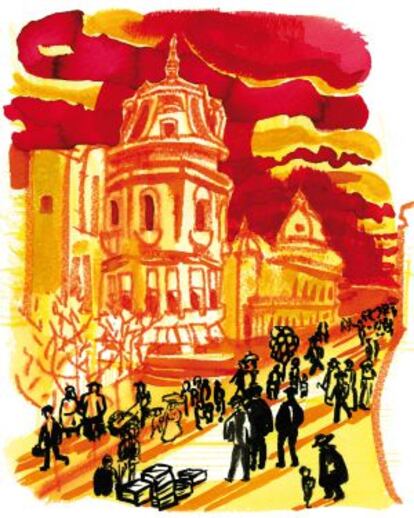Buenos Aires and Borges’ fervor
An illustrated volume of the Argentinean author’s first book comes to light


He was just 24 years old when he wrote his first book, an amateur publication containing a few grammatical mistakes and a cover illustrated by his sister Norah. The book comprised 45 poems that Jorge Luis Borges dedicated to his birthplace; a city he had returned to two years previously after spending seven with his family in Europe, an experience that introduced him to an avant-garde ambience.
Decades later, he remembered how in that moment: “I was seeking sunsets, the slums and misery." In those first verses, he speaks of "taciturn streets" and wonders “if this populous Buenos Aires is nothing but a dream arising in the magic of shared souls.”
“The book’s title, Fervor de Buenos Aires, still has an important ring. Borges is enthusiastic about this re-encounter,” explained Hispanic studies expert Lia Schwartz during a presentation of a new edition of the work last Friday at The Cervantes Institute of New York. Literature experts and connections of the late writer had gathered for the launch of the new illustrated volume to commemorate the 90th anniversary of the debut of one of the most influential voices in Spanish literature.
The new volume, published by Pedro Tabernero, includes color illustrations by Argentinean artist Pablo Racioppi to accompany the 35 poems that Borges selected for the 1969 edition of Fervor de Buenos Aires, in which the author added some notes that Schwartz cites as an affirmation that Borges had honed the mindset that would come to define his revolutionary poetic style. Despite its inconsistent form, Borges himself acknowledged many years later that in this first collection of poems – laden with unique and avant-garde themes – are the keys to all of his subsequent work.

"To Borges this piece was constantly reforming: he would add and take out… go absolutely crazy editing and reediting,” remembered his widow María Kodama, adding that he would publish many versions of this work throughout his lifetime.
The illustrated version of Fervor de Buenos Aires also includes two forwards, one by fellow author José María Conget, and another by Lia Schwartz’s late husband, Isaías Lerner, who before his successful career as a professor, was himself a student of Borges. In a roundtable discussion to commemorate the creator of The Aleph, who died in 1986 at the age of 86, Kodama noted that the publisher Tabernero had served as a “medium” in bringing the writer back into contact with his friend and pupil through this new edition. Kodama also mentioned painter Oscar Schultz Solari, a great friend of the prolific writer, who celebrated Borges in a recent exhibition of watercolors, manuscripts, documents and photographs entitled, The art of friendship. "One of the many things that I have to thank Borges for is the friendships that he left across the world," she said. Schwartz expressed similar sentiments as she recalled her last few encounters with Borges in a Japanese restaurant in New York and in Borges’ lectures on English Literature in Buenos Aires.
Later this year, Fervor de Buenos Aires will be presented in connection with an exhibition in the Argentinean capital, and in Madrid.
Tu suscripción se está usando en otro dispositivo
¿Quieres añadir otro usuario a tu suscripción?
Si continúas leyendo en este dispositivo, no se podrá leer en el otro.
FlechaTu suscripción se está usando en otro dispositivo y solo puedes acceder a EL PAÍS desde un dispositivo a la vez.
Si quieres compartir tu cuenta, cambia tu suscripción a la modalidad Premium, así podrás añadir otro usuario. Cada uno accederá con su propia cuenta de email, lo que os permitirá personalizar vuestra experiencia en EL PAÍS.
¿Tienes una suscripción de empresa? Accede aquí para contratar más cuentas.
En el caso de no saber quién está usando tu cuenta, te recomendamos cambiar tu contraseña aquí.
Si decides continuar compartiendo tu cuenta, este mensaje se mostrará en tu dispositivo y en el de la otra persona que está usando tu cuenta de forma indefinida, afectando a tu experiencia de lectura. Puedes consultar aquí los términos y condiciones de la suscripción digital.








































